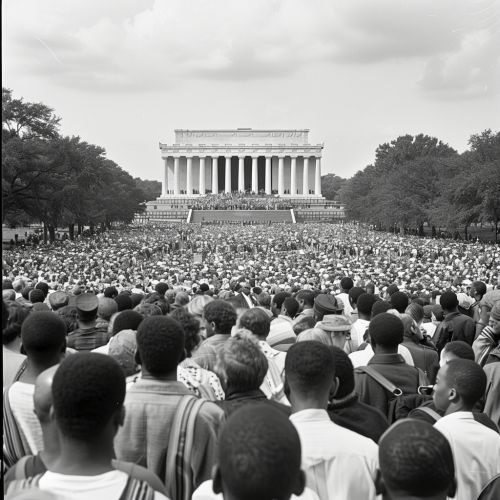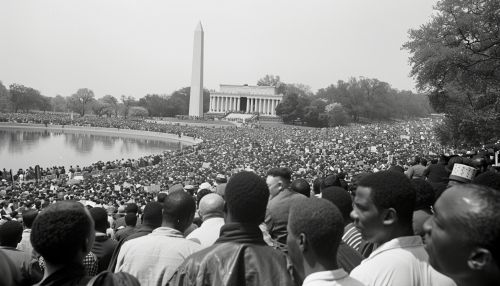March on Washington for Jobs and Freedom
Background
The **March on Washington for Jobs and Freedom** was a pivotal event in the American civil rights movement. Held on August 28, 1963, it was organized by a coalition of civil rights, labor, and religious organizations. The primary goals of the march were to advocate for the economic and civil rights of African Americans. The event is most famously remembered for the delivery of Martin Luther King Jr.'s "I Have a Dream" speech, which became a defining moment in the struggle for racial equality in the United States.
Planning and Organization
The march was meticulously planned by a coalition known as the "Big Six" civil rights organizations: the NAACP, the SCLC, the SNCC, the CORE, the NUL, and the BSCP. The event was also supported by numerous labor unions and religious groups.
The idea for the march was initially proposed by A. Philip Randolph, a prominent labor leader and civil rights activist. Randolph had previously planned a similar march in 1941 to protest racial discrimination in the defense industry, which was called off after President Franklin D. Roosevelt issued Executive Order 8802, prohibiting racial discrimination in the national defense industry.
Goals and Demands
The march had several key demands, which included:
- Comprehensive civil rights legislation that would guarantee all Americans access to public accommodations, decent housing, adequate and integrated education, and the right to vote.
- A massive federal works program to train and place unemployed workers.
- A national minimum wage that would give all Americans a decent standard of living.
- Enforcement of the 14th Amendment to the Constitution by reducing congressional representation from states that disenfranchised citizens.
- A broadened Fair Labor Standards Act to include employment areas previously excluded.
The Day of the March


On the day of the march, an estimated 250,000 people gathered at the Lincoln Memorial in Washington, D.C. The event was one of the largest gatherings for civil rights in United States history. The diverse crowd included people of all races, ages, and backgrounds, demonstrating the widespread support for the movement.
The program included speeches from various civil rights leaders, labor leaders, and religious figures. Notable speakers included John Lewis, representing the SNCC, and Mahalia Jackson, who performed several spirituals. The event was peaceful and orderly, with no incidents of violence or arrests reported.
Martin Luther King Jr.'s Speech
The highlight of the march was the speech delivered by Martin Luther King Jr., which has since become one of the most iconic speeches in American history. In his "I Have a Dream" speech, King articulated his vision of a racially integrated and harmonious America. He spoke of his dream that one day his children would "not be judged by the color of their skin but by the content of their character."
King's speech was a powerful call for racial justice and equality, and it resonated deeply with the audience and the broader American public. The speech helped to galvanize the civil rights movement and brought greater national and international attention to the struggle for racial equality in the United States.
Impact and Legacy
The March on Washington for Jobs and Freedom had a profound impact on the civil rights movement and American society. It helped to build momentum for the passage of the Civil Rights Act of 1964 and the Voting Rights Act of 1965, which were landmark pieces of legislation that aimed to end racial discrimination and protect the voting rights of African Americans.
The march also demonstrated the power of nonviolent protest and the importance of coalition-building in achieving social change. It brought together a diverse array of organizations and individuals, highlighting the broad support for civil rights and economic justice.
See Also
- Civil Rights Movement
- Martin Luther King Jr.
- Civil Rights Act of 1964
- Voting Rights Act of 1965
- A. Philip Randolph
- NAACP
- SCLC
- SNCC
- CORE
- National Urban League
- Brotherhood of Sleeping Car Porters
